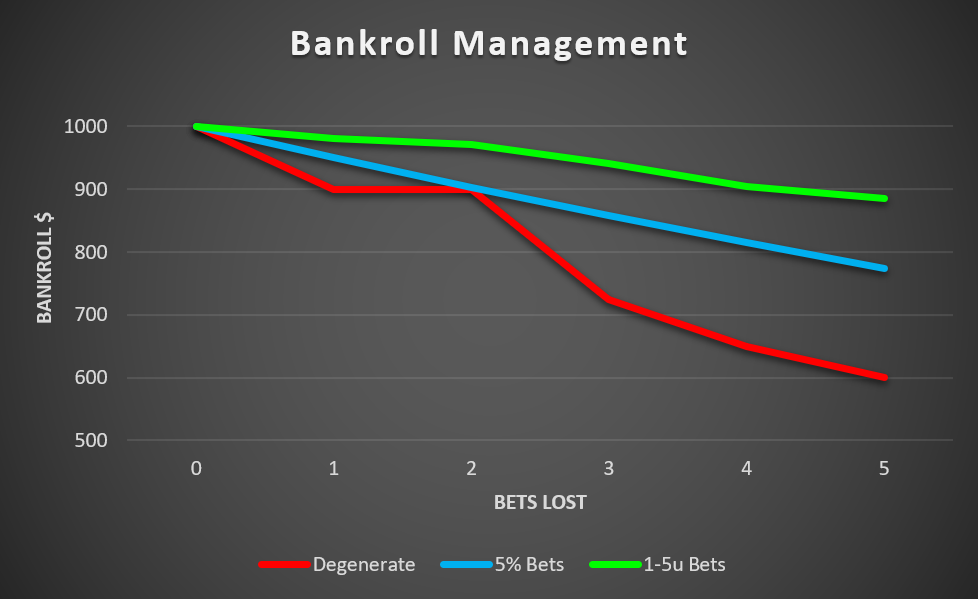Today, we are going back to the basics and talking about bankroll management. In layman terms, this is money management for betting. Instead of teaching you how to budget your regular expenses, we'll go over how to budget for each wager you make. We'll also cover the importance of managing your betting funds, otherwise known as your bankroll, once you open a sportsbook account.

I know this may seem dull, and it is, but it's essential to being successful. You may be the best handicapper in the world, but if you don’t manage your money properly you will get burned and lose it all. One mismanaged losing streak can deplete you of your entire bankroll.
*If you are unfamiliar with betting these terms, check out my Terminology page with over 100 definitions.
Bankroll Management Rule #1
Before we dive into this, there is one very important thing you must know about sports betting that is above everything else. It is related to bankroll management, and it goes along with this article’s theme of being responsible and having self-control. Are you ready?
NEVER BET MORE THAN YOU CAN AFFORD TO LOSE.
If you only learn one thing from me in regards to sports betting (and gambling in general), I hope it is the above statement. Whether you are a recreational or professional sports bettor, this holds true for everyone. Don't bet money you need for rent, food, tuition, and other expenses. Just as important, absolutely do not use credit card debt to fund your bankroll. The money in your sportsbook account is money you can afford to live without (and money you already have). Is this permanently engraved into your brain? Good, now let’s get started!
The Basics
Standard betting advice is to use 1-5% of your bankroll for each bet, and even 5% is considered very aggressive. You can determine how conservative or aggressive you want to be, but please do not bet more than this. The more conservative you are, the better chance you have of surviving a cold streak (it’s going to happen). But whatever percentage you choose, this will determine your unit size.
If you’re a new or casual bettor, you might be asking. “what is a unit?” A unit in sports betting is a measurement of the size of someone’s bet. Because everyone has different sized bankrolls for sports betting, using the term unit instead of the actual size of a bet is a way for us to show your profit or loss in universal terms. If you follow me or others on Twitter and Reddit, you’ll see just about everyone listing their picks and results with x number of units (or simply a “u” or *).
Using unit sizes is also a way to determine your bet amount based on your confidence level. Some use a 1-5 scale, some 1-3, and others may just choose to use a flat betting system where you bet one unit on everything. You can do whatever you’re most comfortable with, but in time I highly suggest you work towards at least a 1-3 unit system.
If you follow other handicappers, they most likely post picks with a certain unit system. The most common is 1-5 units and occasionally 1-7 units. The 1-3 unit plays are average plays, while the 4-5 and sometimes 6-7 unit plays are big plays the handicapper feels they have found a lot of value. Some tipsters don’t follow this though and you may see 10, 20, or even 30 unit “bomb” plays. This doesn’t mean risk 10-30% of your bankroll (they’re not, either). More often than not, this is just a way for them to inflate their results. There’s nothing wrong with tailing someone that does this (as long as they win more than they lose), just be sure to adjust your bets accordingly so you’re never risking more than 5% of your bankroll.
For example, I follow a solid soccer tipster, but his unit scale is 5-10 units with an occasional “double-max” 20-unit play. My unit size is 1%, so I’m obviously not dropping a fifth of my bankroll on an Australian soccer match. I’ve adjusted to where his 5-10 units are 1-5 units for me, and 20 units can be 6-7 units if I like the play as well. It’s that simple.
Bankroll Management in Action
I use a 1-5 unit scale for my picks, so let’s use that as an example. Since we should never risk more than 5% of our bankroll on a single bet, let’s stick to one unit being 1% of our $1,000 hypothetical bankroll. Therefore, one betting unit is $10.
With a $1,000 bankroll, we will bet $10 to $50 per bet depending on our perceived value and confidence in a pick. This may seem like a very small and insignificant amount, but betting any more than this can sink you fast just by losing a few bets in a row. Even with this strategy in place, 5-unit bets should be very rare and should only be done when you have a significant edge (i.e advantage) as explained above.
To illustrate this, let’s compare three hypothetical bettors all with a $1,000 bankroll. One is a completely reckless degenerate, one is aggressively betting 5% on everything, and one is using our 1-5 unit system. Let’s say they all lose their next five bets (which will happen to you at some point).
The table below shows how much each bettor risked for their next five bets. After each starting at $1,000, their remaining bankroll is shown in the far right column. For our responsible 1-5 unit bettor, their unit size is in parentheses for each bet.
| Bet #1 | Bet #2 | Bet #3 | Bet #4 | Bet #5 | Bankroll | |
|---|---|---|---|---|---|---|
| Degenerate | -100.00 | -100.00 | -75.00 | -75.00 | -50.00 | 600.00 |
| 5% Bets | -50.00 | -47.50 | -45.12 | -42.87 | -40.72 | 773.79 |
| 1-5 Units Bet | -20.00 (2u) | -9.80 (1u) | -29.10 (3u) | -37.64 (4u) | -18.07 (1u) | 885.39 |
For visual learners like me, the graph below displays the above table – this is what happens to a bankroll with and without proper bankroll management:

As you can see, a five-bet losing streak is much less harmful to a bankroll when applying proper bankroll management. Our hypothetical degenerate could even be considered a conservative example, as some self-control was shown by reducing their bet size (rather than chase the losses and increase each ensuing bet). However, 40% of the degenerate’s bankroll was still lost in just five bets.
Meanwhile, the green line shows that a responsible unit system only lost $150 (15%). It's still a tough loss to swallow, but much less painful. Additionally, the blue line hopefully shows how aggressive 5% bets really are and how fast you can lose your entire betting fund. In just five bets, we would have lost over 25% of our bankroll. It could happen even faster if you don’t adjust to your new balance frequently.
Either way, I cannot stress enough how important bankroll management is to be successful. In other words, having self-control with your bets is vital to become a profitable sports bettor. There is plenty more to bankroll management, but now you understand the basics to get started. If you haven’t already, be sure to subscribe to Fast Break Bets by clicking here. You’ll receive new updates to my blog as well as free picks every Friday!
Also, if you think you’re ready to take the plunge into sports betting (or improve your betting success), click to subscribe to my premium betting service – Fast Break MVP! You can view all the details and my past results here. Lastly, feel free to ask me any questions by sending me a message or by tweeting @FastBreakBets.
Seven blessings fam,
Stephen